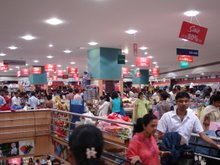Get ready to pay more for rice, pulses
Your VAT (value-added tax) burden is set to rise over with the states and Centre on Thursday agreeing to raise the basic duty rate from 4% to 6% by April 2009. The proposal, which has been cleared both by the Centre, and was discussed by the Union cabinet on Thursday, will see VAT on a host of products ranging from branded bread, paddy, wheat, rice, pulses, edible oils and inputs like bulk drugs, ores and minerals rise to 5% from From April 1 2008, will go up again 6% from April 2009. An increase in the tax incidence on intermediates and raw materials is also expected to result in higher cost of the final product since manufacturers are likely to pass the burden to consumers. But smokers may start feeling the pinch from this year itself, with states starting to levy 12.5% VAT on tobacco products from April 1 this year. A similar tax treatment awaits textiles products though a large number of items like hosiery, cotton and silk fabrics facing 4% VAT. There will also be a higher tax burden for the central government as all inter-state purchases by it will now attract the applicable VAT rate instead of the concessional 4% tax that it pays at present. The move is expected to help states generate an additional Rs 1,500 crore revenue. While the move was originally aimed at enabling states to do away with entry tax and octroi - which generate around Rs 10,000 crore for the states - it is not clear if the original intent will be followed or the hike in Vat rates will turn into another revenue raising exercise. In a bid to maintain a simple Vat structure, the Centre is against any move to introduce a new tax rate and had instead suggested that the items attracting 4% rate be moved to 6% in a phased manner.
The increase in the basic Vat rate had also been proposed as a means to reduce the Centre's compensation burden for the phase out of the 4% central sales tax (CST) by states, which is set to kick in from April. While CST is levied by the Centre, the entire revenue is passed on to states. A removal of CST was part of the scheme for full implementation of Vat, a precursor to a common goods and service tax by both the Centre and states.
While the states were claiming large compensation for phasing out of CST - which generated Rs 18,000 crore in 2005-06 and is projected to grow 18% this fiscal - finance minister P Chidambaram is expected to provide for a compensation package of Rs 2,500 crore for 2007-08. But the more progressive states, which have already started the reduction of CST will not be entitled to any compensation. The key element of the compensation package - the power to allow states to levy taxes on 77 services - is proving to be the most contentious issue with no agreement on the list of services. As an interim measures, which will continue between April 2007 and March 2009, the Centre will pass on the revenue realised from tax on 33 existing services to states. But given the difference in the consumption pattern across states, there is agreement on the list of services. In any case, states are not willing to accept the list of 44 new services, which they will be able to tax once the necessary amendments have been carried out. The list of new services includes those like legal, education and health.
courtesy:economictimes
For more on Retail India visit us at www.retailindia.tv

No comments:
Post a Comment